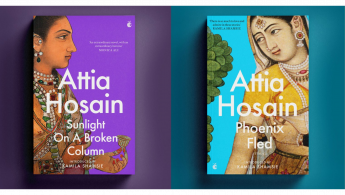Attia Hosain reissued: Reflections of a dying British Raj and the desire for independence
This August, Virago Modern Classics republished two of Attia Hosain’s books on the 60th anniversary of her influential novel, Sunlight on a Broken Column.
Attia Hosain is an important yet relatively obscure figure of South Asian literary history, compared to her contemporaries Anita Desai and Bapsi Sidhwa.
Hosain was born in Lucknow in 1913. While her father had studied at Cambridge University, her mother had established an institute for women’s education and welfare in Lucknow. She got her education from Lucknow’s Isabella Thoburn College and was also fluent in Arabic and Persian. Her family subscribed to progressive ideas and so did her husband.
"Hosain evokes the lost vibrancy of yesteryear Lucknow with its elaborate customs and rituals in all its glory"
She was a part of the All-India Progressive Writers’ Association, a group of socialist writers which included Ahmed Ali, Mulk Raj Anand and Sajjad Zaheer. In 1947, when independence from British rule resulted in the creation of Pakistan, she chose not to migrate and instead went to Britain with her husband, Ali Bahadur Habibullah, and children. There she continued to work as a writer, journalist and broadcaster for the BBC.
She published her first collection of short stories titled Phoenix Fled in 1953. Her only novel, Sunlight on a Broken Column, was published in 1961. The manuscript of an unfinished novel was discovered among her papers after her death in 1998. It was later published as No New Lands, No New Seas, along with some of her uncollected stories in Distant Traveller: New and Selected Fiction.
Attiya’s niece is a Pakistani author and journalist Muneeza Shamsie and her great-niece is prolific author Kamila Shamsie.
In the vein of progressive writers of her generation, both books by Hosain are masterful depictions of social realism.
Phoenix Fled
This collection features twelve stories that are set around the Partition exuding pathos and longing. The characters in this book are coming to terms with change and the accompanying grief for all that is lost in the process.
In the first eponymously titled story, the protagonist is an old woman who is left behind by her family since she is not willing to leave her ancestral house to go to another country. The woman was so old that the village people associated “her deathless years with the existence of their village.” She was close to the children since mentally, she existed in their world. “Her mind telescoped life to make it possible for her weak old age to be sustained by the strength of her childhood.” At the climax as a mob gathers to burn down her house, she expresses her sole concern as follows:
“Mind,” she scolded, pointing her bony finger, “mind you do not step on the doll’s house.”
These modernist short stories, inspired by Katherine Mansfield and before him Chekhov, place the narrative camera both outside and inside the character’s minds. In this way, the readers get a simultaneous view of the context in which these characters exist.
"Both books by Hosain are masterful depictions of social realism"
In The First Party, a new bride finds herself unmoored in a gathering of her husband’s Western friends. The protagonist seems to be in unfamiliar territory and copes with this feeling of alienation by trying “to deny her lonely unhappiness with contempt and moral passion.”
In The Street of The Moon, an arranged marriage takes place between a young servant girl and a middle-aged cook with an opium habit. When the cook invites his young son from his first wife to stay with them, mayhem follows. The girl’s unconventional behaviour is frowned upon and she is soon made an outcast by the conservative society.
Time is Unredeemable narrates Bano’s interminable wait for her husband that finally comes to an end. It is the early 1940s and her husband is coming back after nine years due to the end of the war. At 16, Bano was married off to Arshad a month before he sailed to England. In the ensuing years, Bano is “living the life neither of a wife nor a widow.” His short formal letters are the only form of intimacy they have. The inevitable tragedy is the hallmark of the stories in this collection.
Sunlight on a Broken Column
Sunlight on a Broken Column is Hosain's only full-fledged novel and an astute depiction of upper-class Muslim society in the first half of the 20th century. Through the life of the protagonist, Laila, this richly drawn family saga captures the realities and paradoxes of old Muslim tradition with the rapidly changing times as the British Raj comes to an end.
Laila belongs to an upper-class Muslim family and desires to be well educated like her male counterparts. She lives in a traditional Muslim household where a formidable grandfather serves as a patriarch. His eventual death means a new way of life for Laila since she is now to live with her uncle Hamid, a liberal and autocrat.
This serves as an allegorical representation of the incongruence of a traditional upbringing with the impending independence bringing a change in the social fabric of India. We see this friction play out over a span of twenty years which are also chaotic years in India’s history.
Hosain evokes the lost vibrancy of yesteryear Lucknow with its elaborate customs and rituals in all its glory. The title is inspired by T.S. Eliot’s poem The Hollow Men, the novel, as she wrote, was meant to be her elegy to “the breaking up of a family when the whole background (was) changing.” It describes an era on the cusp of oblivion, ushering in a sociocultural overhaul.
Rabeea Saleem is a Karachi-based book critic writing for several international publications including The Irish Times, The National UAE and Spectator UK


![Minnesota Tim Walz is working to court Muslim voters. [Getty]](/sites/default/files/styles/image_684x385/public/2169747529.jpeg?h=a5f2f23a&itok=b63Wif2V)






